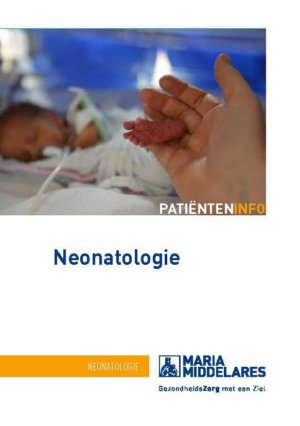Developmental Care
Our unit participates in a government project in which care is entirely focused on your baby's development. This means that in every aspect of care (nutrition, pain management, care for sleep/wake rhythm...), we will address the specific needs in a way that also guarantees optimal development.
The welcome leaflet of the Neonatal Unit at Maria Middelares General Hospital provides more details about how we operate. Among other things, you will find more information on visiting and accessing the department, the medical and nursing care on the ward and rooming-in options.
Currently, the Neonatal Unit of St Vincent General Hospital in Deinze does not have a welcome leaflet.
Only available in Dutch:

Onthaalbrochure neonatologie
DownloadAvoiding bright light and noise
Avoiding bright light and noise- Incubators are covered in order to limit these stimuli, especially in the case of premature infants.
Our unit also has dimmable lights. - Monitors, which monitor oxygen levels in the blood, respiratory frequency and heart rate,
only make noise at alarm values. - Telephone calls are made in the office, and not nearby the baby.
- We also ask you to please speak softly.
Respecting day/night rhythm
Respecting day/night rhythmUninterrupted sleep phases are important for the further development and growth of your baby. That is why we try to combine the various types of care so that your baby can sleep peacefully between treatments. A pacifier can offer comfort when you are not there, and it provides peace and security.
Positioning
PositioningYou will see that babies often lie in a kind of textile nest in their incubator (which in itself is a small, warm space). Premature babies have little strength and muscle tension and they have very loose joints. They can hardly move against gravity. As a result, they are not able to adopt a curved posture or keep head and torso in line with the limbs symmetrically towards the middle. However, this posture is very important to counteract excessive muscle tension, limit startle reactions, promote a feeling of security, be able to reach the mouth with her hands... In the nest, your baby is supported in different positions (back, side and abdomen) depending on her stage of development.
This also remains an important point of attention in the transition from the incubator to the bed.
Squids
SquidsThe squid is a crocheted doll that ensures that your baby does not reach for infusion tubes, probes or monitor cables. By being able to grasp the tentacles of the toy, the baby becomes calmer and is able to regulate her breathing and heart rate better.
Since babies are very vulnerable in neonatology, these toys meet very strict quality requirements. For example, there are concrete agreements about length, filling and the yarn used.
The squid should be washed at 60 °C in case of visible soiling, and at least once a week.
It goes without saying that these toys are only allowed in the hospital when the children are monitored. For home, we advise you not to place this toy with the child. Please refer to the Child and Family guidelines (no stuffed animals for babies under 6 months).
Pain
PainAvoiding and fighting pain is important for good development, but in a baby, pain is not always easy to detect. That is why your baby will be checked several times a day for multiple signals that help us determine some kind of pain score. Based on that, pain medication may be administered in consultation with the paediatrician.
Unfortunately, painful procedures such as blood draws and infusions are sometimes unavoidable. In those cases, we try to alleviate the painful experience with a pacifier or a sugar solution developed for that purpose.
Kangaroos
KangaroosBabies, both full-term and prematurely born, need not only food and drink but also physical contact. To do this, we place the baby without clothing on the naked skin of the mother or partner and cover the baby with a warm cloth. This keeps the body temperature at level, the baby relaxes better and her breathing becomes calmer. In addition, skin contact promotes the emotional development. This kind of intense contact is called kangarooing.
Something wrong or unclear on this page? Report it.



